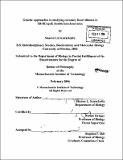Genetic approaches to studying coronary heart disease in SR-BI/apoE double knockout mice
Author(s)
Karackattu, Sharon Liz
DownloadFull printable version (22.99Mb)
Alternative title
Genetic approaches to studying CHD in SR-BI/apoE double knockout mice
Other Contributors
Massachusetts Institute of Technology. Dept. of Biology.
Advisor
Monty Krieger.
Terms of use
Metadata
Show full item recordAbstract
Coronary heart disease (CHD) is a major healthcare concern in both developed and developing nations. The principal cause of CHD is atherosclerosis, the buildup of fatty deposits in vessel walls. SR-BI/apoE double knockout (dKO) mice are a novel mouse model of human CHD, exhibiting spontaneous coronary occlusive atherosclerosis, myocardial infarction, cardiac dysfunction and premature death. This model represents a unique system in which to study the two principal underlying mechanisms of atherosclerosis and CHD, inflammation and lipoprotein lipid metabolism. The first part of this thesis demonstrates that B- and T-lymphocytes do not play a significant role in development or progression of atherosclerosis or CHD in SR-BI/apoE dKO mice. More importantly, this study eliminates B- and T-lymphocyte-driven immunoglobulin-mediated inflammation as a significant mechanism instigating or exacerbating myocardial injury in dKO mice. Strikingly, the mice generated for this study also demonstrate that genetic background influences both average lifespan and lifespan variability of dKO mice. The second study investigates alterations in lipoprotein metabolism on CHD and demonstrates that hepatic lipase deficiency, despite raising plasma cholesterol levels, retards development of both aortic and coronary occlusive atherosclerosis in dKO mice. (cont.) This reduction in atherosclerosis is associated with delayed onset and/or progression of hypertrophy, myocardial infarction and cardiac dysfunction as well as a 37% extension in lifespan. Both of these studies, along with others, suggest SR-BI/apoE dKO mice experience atherosclerotic coronary-occlusion-induced ischemic heart disease and that they may be a valuable tool in which to investigate the etiology of as well as influences of genetic, environmental and pharmacologic manipulations on CHD.
Description
Thesis (Ph. D.)--Massachusetts Institute of Technology, Dept. of Biology, 2006. "February 2006." Includes bibliographical references.
Date issued
2006Department
Massachusetts Institute of Technology. Department of BiologyPublisher
Massachusetts Institute of Technology
Keywords
Biology.